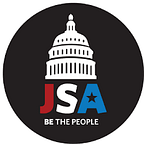One Student Election Judge’s Experience
by Erin Kim, Vernon Hills High School
As a seventeen-year-old in an election year hoping to do my part in American democracy, when I saw an Instagram story post calling for poll workers on Election Day, I signed right up. In preparation for November 1st, the training was time-consuming: I studied powerpoints, watched an hour-long training video, and attended a three hour, hands-on voter check-in judge training.
Fast forward to Election Day Eve, I was nervous all day because of the unprecedented number of early voters across the country — if turnout was the same on Election Day, I could expect to be in contact with thousands of voters and work without a break to process the long lines. For my personal safety and emotional sanity, I hoped there wouldn’t be lines out the door. As a poll worker, you were required to arrive at your precinct at 5am to help set up, and left after you packed up; the polls in Illinois closed at 7pm CT.
Punctual as I am, I was the first to arrive at my polling location, the sky still pitch black. I was ecstatic to see two other high schoolers (who I later found out went to Libertyville) working the polls also, because I thought that I would be the only teen there. The rest of the poll workers were mid-fifty/mid-sixty somethings, and one made sure to tell me she’d been a poll worker many many times before.
Before the precinct officially opened at 6am, the precinct manager — a grandfatherly man named Gene who I immediately liked — gave the poll workers a brief speech about the importance of our job, and how in the 30+ years he was a poll worker, this year may have been one of the most important years to be a poll worker. At the end of his speech, he did something I never expected: he shed a tear. I had never seen someone get so emotional about protecting democracy, and it made me carry myself a little higher that day and made me proud to work the polls.
At 6am, the polls finally opened, and anticlimactically, a handful of voters trickled in in the starting minutes, and sporadically came in within the morning hours. I had expected the precinct doors to burst open and the voters to steadily stream in, but at times in the morning, the precinct was completely empty. As a voter check-in judge, my job was to pull up the voter on the e-Pollbook, and verify their signature with the one from the clerk office’s records. In Illinois, a voter doesn’t need proof of ID to vote, so all they had to do was sign an application, and a matching signature would allow them to receive their designated ballot.
As the voters ebbed and flowed, us poll workers, expecting a busy morning, needed something to pass the time, and so I chatted with a poll watcher from Tenth Dems, while the fifty-somethings turned to petty gossip and pretentious stories about their ~fancy~ election judge experience. I quickly grew annoyed with some of my fellow poll workers, and took a break outside to eat my lunch and get away from the pretension.
The afternoon was languorous, like a drawn-out Sunday afternoon. Voters, save for a select few, all but dried up from 1–4pm, and I turned to Sudoku and outdated crossword puzzles to pass the time. However, in a marathon of an afternoon, there were bits of joy: every time a first-time voter cast their ballot, all the poll workers would erupt into a smattering of applause and cheers, and throughout the day, people brought us donuts and homemade cookies.
At 6pm, the polls on the East Coast closed, and I began to check my phone for incoming results every ten minutes. We still were averaging around 20 voters an hour until 7pm, when we closed the precinct and started following procedure to tally the ballots and shut down e-Pollbooks. To ensure an accurate count, the number of ballots issued had to exactly match the number of ballots collected, and the ballots were run through a machine to tally the votes, which printed a long receipt of the precinct’s results, which averaged around 230 voters that day. I was tasked with taping the precinct results to the front door so the public could see the results, and in each result printed on the paper, I could physically see how each voter’s vote counted for a race, such as the presidential, senate, or state representative seats, as well as the tax amendment referendum vote. It was incredibly fulfilling to know that I helped participate in making voter’s voices heard, especially in such a pivotal election mid-pandemic.
I left the precinct at 7:45pm, almost dozing off on the drive home, but I left fulfilled and reminded of the power of the people and the power of democracy: each voter I checked in cast a ballot, and each ballot cast contributed to deciding which leaders were in the Illinois Congress, representing our state in D.C, and which candidate would be president. My experience being a student election judge is something I’ll never forget.
